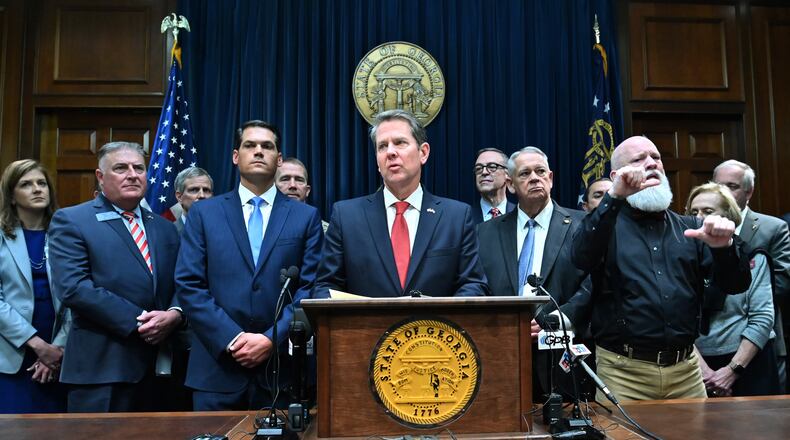Gov. Brian Kemp signed the mid-year budget Tuesday that funds the state through the end of June and includes $100 million to fight the coronavirus.
The General Assembly approved the measure last week after Kemp requested the money to assist the Georgia Emergency Management Agency and the Department of Public Health in their response efforts.
Lawmakers also added $5 million in the budget for rural hospitals, which they said may face special costs associated with the virus.
Legislators passed the plan on Thursday before suspending the 2020 session.
The governor took the unusual step of shifting the money from the state’s reserves, which are typically used only in the case of a fiscal emergency. The last time a governor used such reserves were in the aftermath of the Great Recession.
“Over several months, I have worked closely with lawmakers to develop an amended fiscal year 2020 budget that reflects our priorities, reduces red tape in government, prioritizes public safety, and puts Georgia families first," Kemp said in a statement.
“This budget includes $100 million in emergency funding to fight COVID-19 in the weeks ahead as we continue to see more cases in communities across Georgia, and I applaud the General Assembly's strong support in these difficult times.”
Kemp had ordered state agencies in August to prepare plans for 4% budget cuts this fiscal year and 6% next year to both respond to slow tax collections last year and provide enough money for the governor's priorities, including a $2,000 teacher pay raise and his effort to attack gangs.
The House voted Tuesday to reduce that raise to $1,000 as part of the budget for fiscal 2021, which begins July 1, but that $28.1 billion spending plan awaits Senate action when legislators return to finish the session.
About three-fourths of the budget — money that goes to k-12 schools, colleges, the health program Medicaid and transportation — was exempted from reductions.
The House and Senate agreed to mitigate some of the cuts Kemp recommended in the mid-year plan.
The midyear budget would still cut $159 million in spending and leave 1,255 vacant positions unfilled, but the House and Senate rearranged how reductions would be made.
Kemp’s proposal to eliminate vacant state positions was controversial, with lawmakers saying some of them — including crime lab scientists and guards in the juvenile justice system — need to be filled. The bill lawmakers approved restored funding for some of the positions, including public defenders, lab workers and Department of Agriculture food safety inspectors.
Both chambers said no to Kemp’s cuts in funding for preparing doctors at the Morehouse School of Medicine and Mercer University’s medical school, and to his proposed reduction to the Rural Health Systems Innovation Center at Mercer, a project lawmakers started a few years ago to help improve health care in rural Georgia.
They also reduced cuts that Kemp proposed for mental health programs and eliminated reductions for local library materials, and they pushed back on Kemp’s proposal to cut $6.3 million in grants to county public health departments.
About the Author
Keep Reading
The Latest
Featured




